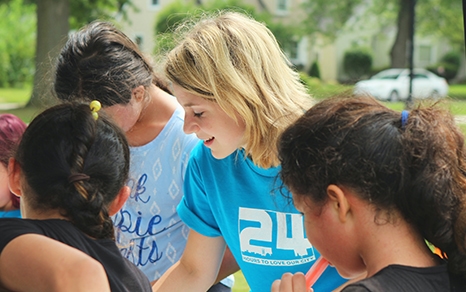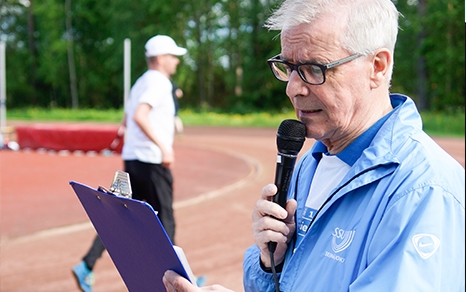Volunteer strategy
and
planning
Volunteer recruitment and deployment
Volunteer management and retention
Volunteer development and training
Welcome to the Learning Resources and Case Studies on Sport Volunteering
For each individual Pillar you can explore learning resources, or get inspired by case studies.
You can download the Learning Resources for a full Pillar or for each Sub-Pillar by clicking on the download icon .

||| PILLAR 1
Volunteer strategy and planning
This first Pillar of the toolkit focuses on supporting you to take an overview of volunteering in your organisation: why it is needed, where development may need to take place, the state of volunteering in your geographical footprint. From here, you can access resources that will help you plan to meet your volunteering needs in a smarter, more efficient way that is more likely to yield positive results.
ACCESS PILLAR 1
LEARNING RESOURCES
1.1 - Assessing your volunteer needs – workforce analysis and skills gaps
Volunteers are vital to the success of many sports organisations, but how often do we take the time to assess the size and nature of the volunteer workforce required for a successful operation?
Even if you know what roles in your organisation need to be done by volunteers, have you identified the required skills and knowledge in each position?
This section features analysis tools and helpful content that will help you gain a stronger appreciation for your ideal volunteer workforce, including the skills gaps you may need to fill with new or upskilled volunteers.
1.2 - Understanding volunteering in context
How well do you understand volunteering and what it means to the individuals who undertake it?
Is your organisation obtaining all of the potential benefits of a diverse volunteer workforce?
This section will enable you to research the nature of volunteering in your geographical area and the sport or sector within which your organisation operates. Find out how you can assess the ‘bigger picture’, including locating and using statistics regarding the levels of volunteering in your area/ sector, as well as insight into extrinsic drivers for volunteering such educational requirements. You will gain a better appreciation for why people volunteer and why they leave volunteering roles.
1.3 - Developing, implementing and evaluating a volunteer strategy / plan / programme
Once you have undertaken the underpinning research and enhanced your understanding of volunteering, you can use the resources in this section to help you map out your volunteering needs in the form of a broader strategy and a more detailed, operational plan. This will help you take a more informed and structured approach to managing all aspects of volunteering. You will also find a range of monitoring, evaluation and learning tools to help you gain deeper insight into the impact of your volunteers and the support you created for them.
1.4 - Developing an inclusive, equitable, volunteer-friendly culture
Volunteers that do not stay long with sport organisations often cite that they did not feel properly welcomed. Conversely, volunteers are more likely to stay and thrive if the organisation is configured appropriately around their needs. This includes developing a positive culture for volunteer success.
This section therefore offers resources to help you deepen your appreciation of ‘culture’ and what it means in this context. In addition, equity, diversity and inclusion should be a central consideration when planning your volunteer workforce. This section therefore includes resources to help you ensure that volunteer opportunities and progression are open to all.
1.5 - Seeking financial and other resources for volunteering
Funding is one of many important resources that can support the successful implementation of your strategy for volunteering in your sport organisation.
Other resources include equipment, facilities and less tangible assets such as knowledge and influence. Find out how your organisation can identify its resource needs and acquire the resources required to support volunteering.

||| PILLAR 2
Volunteer recruitment and deployment
The second Pillar of the toolkit provides support for all aspects of the volunteer recruitment process, from working out individual volunteer roles, to attracting and selecting volunteers, and engaging them in your organisation.
ACCESS PILLAR 2
LEARNING RESOURCES
2.1 - Developing volunteer role descriptions
This section provides guidance on how to clearly set out the roles you have in mind for volunteers, including the duties and responsibilities, time commitment and skills required.
This activity will help you double-check that you have accurately identified the number and type of volunteer roles you need. It is also particularly useful in helping interested individuals to decide whether your volunteering opportunity is something they would like to pursue.
2.2 - Finding, attracting and recruiting volunteers
Do you have problems identifying potential volunteers, attracting and persuading them to contribute to your organisation?
This section features resources to support you with this, such as innovative ideas for recruiting your next generation of volunteers. Drawing upon marketing communication good practice as well as established approaches to recruitment, you can also find guidance on how you can run a campaign that is accurate and attractive to potential volunteers.
2.3 - Conducting a volunteer selection process
Here you will find support to enable you to conduct a transparent, fair and rigorous selection process that will meet the needs of both your organisation and potential volunteers, including staging interviews if needed. Working in this way will hopefully ensure a better match for all parties.
2.4 - Agreeing expected volunteer contributions
Building upon the volunteer role descriptions you will have already developed, this section will support your organisation in working with each newly-appointed volunteer to agree how the role should be implemented, including the levels of responsibility, key tasks and time input being asked of the volunteer.
2.5 - Providing a volunteer induction programme
This sometimes-overlooked aspect of the recruitment process is crucial in helping new volunteers to feel part of your organisation from the start.
Advice and guidance can be found on how to design and implement an induction programme, including volunteer orientation as well as initial training. This should ensure an induction experience that is personalised, informative and welcoming for your volunteers.

||| PILLAR 3
Volunteer management and retention
The third Pillar of the toolkit considers the practicalities of working with your volunteers on a day-to-day, week-to-week basis. The principles set out in the first pillar “Volunteer Strategy and Planning” are operationalised here, as you work with your volunteers to ensure they have a positive experience and contribute to the running of your sport organisation or event.
ACCESS PILLAR 3
LEARNING RESOURCES
3.1 - Maintaining an inclusive, equitable, volunteer-friendly culture
In the first Pillar we looked at how you can work towards establishing a volunteer-friendly culture. In this section you will find resources to help you embed this through the day-to-day running of your sport organisation, turning principles into practice to ensure every volunteering experience is a positive one for your volunteers and your organisation. Particular emphasis is placed on the pursuit of equity and inclusivity in all your work with volunteers.
3.2 - Keeping volunteers and participants safe (including legal obligations)
The resources in this section will help your organisation ensure you are meeting your legal obligations in terms of equity and diversity, health and safety, safeguarding and so on for your volunteers. Here you will find guidance to help you develop a suitable code of conduct that sets out the behaviours volunteers will be required to demonstrate in order to ensure that all stakeholders in your sport organisation are safe, well treated and included.
Additionally, you will find resources to support you in identifying hazards affecting volunteers, evaluate them and install processes and procedures to ensure volunteer safety is not compromised.
3.3 - Communicating with and consulting your volunteers
With so many options available, digital and otherwise, what is the most effective way to communicate with volunteers undertaking different roles in your organisation?
This section will enable you to review your current approach whilst identifying the most appropriate means by which to keep your volunteers informed and actively involved. This will enable you to gather volunteer feedback, ideas and advice regarding improvements, helping you undertake timely and comprehensive consultation to ensure your decision-making is volunteer-informed.
3.4 - Monitoring volunteers’ performance and acknowledging their contributions
In order not only to measure the wider impact of volunteers, but also to ensure the effective day-to-day running of the organisation, volunteer performance must be routinely monitored. This should be a positive activity for all parties, supporting volunteers to do the best possible job in a welcoming environment as well as enabling your organisation to thank them for their contributions.
In addition to having more formal implications for individual career development, this will aid with retention and volunteer performance as they are more likely to feel like a valued part of your sport organisation.
3.5 - Coordinating volunteers and managing turnover
Regardless of the size of your organisation, it is necessary for at least one person to be responsible for the ongoing supervision and coordination of the volunteer workforce. In addition, volunteers’ engagement in sport organisations is always life-limited, so it is operationally critical to plan for succession.
This section therefore includes some practical management resources to help you to coordinate and manage your volunteers. This includes tools to help your organisation to respond to volunteer resignations by identifying the gaps they will leave and identifying and supporting their successors.

||| PILLAR 4
Volunteer development and training
The fourth and final Pillar of the toolkit deals with all aspects of developing your volunteer workforce. It is important to offer current and potential volunteers the opportunity to enhance their personal, professional and career skills so that, as well as being intrinsically rewarding, the volunteering experience contributes to their personal and professional development.
ACCESS PILLAR 4
LEARNING RESOURCES
4.1 - Developing volunteers' skills through training and other means
The development of volunteers’ skills makes an important contribution to the successful operation of your organisation, helping to bridge any identified skills gaps across the workforce. It is also important that your volunteers understand how the skills they develop within your organisation are useful in other aspects of their lives.
This section will therefore enable you to work with individual volunteers to identify skills needs and help them to manage their development accordingly. Formal training can be expensive and time consuming, so this section provides tools and ideas for your volunteers to be able to access certificated and other training opportunities.
4.2 - Supporting internal volunteer progression
A motivating factor for some volunteers is to be able to assume greater levels of responsibility as they become more experienced. For those happy to take on higher levels of seniority, it is usually necessary to support them through training and other forms of skill development. This section will assist your organisation to work with your volunteers to identify and discuss their aspirations for progression, as well as plan and manage any ‘promotions’.
4.3 - Mentoring volunteers
Mentoring is a specific relationship that involves one individual (for example, a more experienced volunteer) supporting and advising another in a structured way. Effective mentoring can accelerate and consolidate volunteers’ integration and development, enhancing their ability to contribute to your sport organisation’s work.
Acting as a mentor can also be a developmental experience. Here you will find resources that will help you clarify the meaning of mentoring as it applies to your organisation, plus identify and support mentors and mentees.
4.4 - Recording volunteers’ experiences and achievements
If you are providing pivotal developmental experiences for your volunteers, it is appropriate to develop mechanisms for recording and celebrating their achievements. This may be of use in obtaining educational places, getting jobs and setting the volunteering experience in the wider context of an individual’s development. The resources in this section will help you develop clear records of achievement that can be readily accessed and completed by your volunteers.
4.5 - Facilitating volunteers’ personal and career development
Alongside the other categories in this Pillar, it is advantageous to be able to help tailor the day-to-day volunteering experience to each individual’s wider development goals. Volunteering interactions can thus serve the interests of both your sport organisation and the individual volunteer. Here, therefore, you will find ideas to help your organisation design volunteering opportunities that are developmental as well as operationally important.